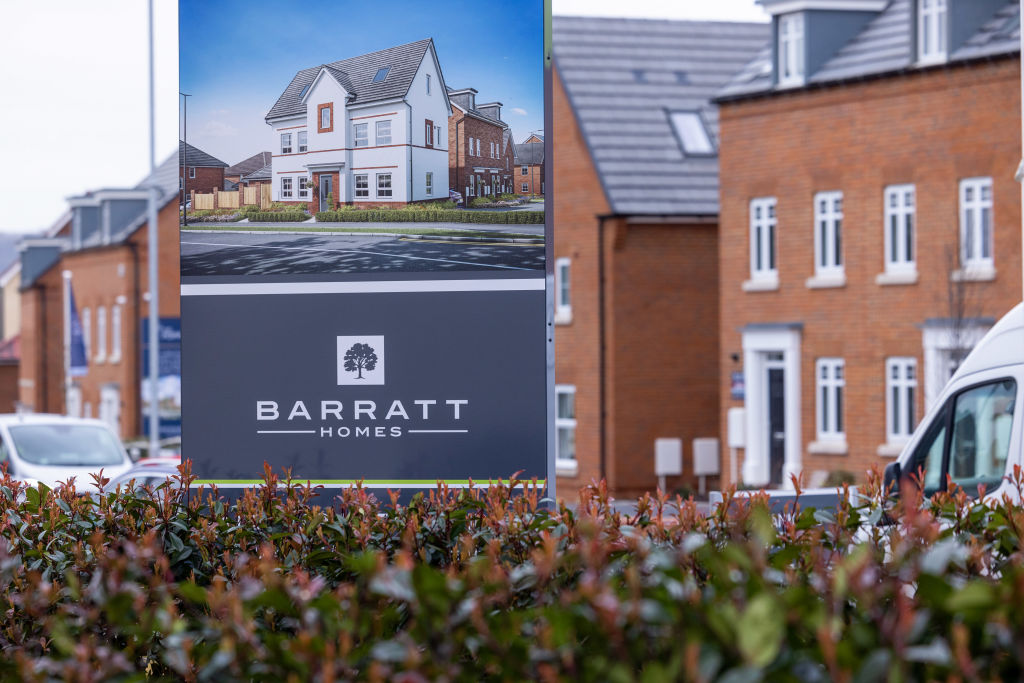Profits dive at Barratt Developments - should you invest in housebuilders?
The fall in profits comes despite excitement about the prospects for housebuilders on the back of Labour’s pledge to build 1.5 million new homes.


Get the latest financial news, insights and expert analysis from our award-winning MoneyWeek team, to help you understand what really matters when it comes to your finances.
You are now subscribed
Your newsletter sign-up was successful
Want to add more newsletters?

Twice daily
MoneyWeek
Get the latest financial news, insights and expert analysis from our award-winning MoneyWeek team, to help you understand what really matters when it comes to your finances.

Four times a week
Look After My Bills
Sign up to our free money-saving newsletter, filled with the latest news and expert advice to help you find the best tips and deals for managing your bills. Start saving today!
Profits have slumped at Barratt Developments, with the housebuilder suggesting high interest rates have depressed the UK housing market.
For the year ending June 30, profits at Britain's biggest housebuilder plunged 57% to £385m, while turnover fell 22% to £4.17bn. However, Barratt confirmed its previously reported figure of 14,004 home completions for the year.
Chief executive David Thomas said: "We are pleased to have delivered total home completions at the upper end of our expectations for the year, despite the challenging backdrop.
MoneyWeek
Subscribe to MoneyWeek today and get your first six magazine issues absolutely FREE

Sign up to Money Morning
Don't miss the latest investment and personal finances news, market analysis, plus money-saving tips with our free twice-daily newsletter
Don't miss the latest investment and personal finances news, market analysis, plus money-saving tips with our free twice-daily newsletter
"Whilst demand continues to be sensitive to mortgage affordability, and reduced land buying activity during the past two years has had a near-term impact on the number of outlets we are operating from, we are well-positioned to meet the strong underlying demand for new homes of all tenures in the UK.”
The fall in profits comes despite excitement about the prospects for housebuilders on the back of Labour’s pledge to build 1.5 million new homes over the next Parliament. Barratt’s share price has increased by almost 7% over the last six months.
Thomas said: "We welcome the government's proposed reforms of the planning system as one of the key levers to increase housebuilding, drive economic growth and tackle the chronic undersupply of high-quality, sustainable homes."
Despite the positivity over the building targets, construction and borrowing costs have both risen since 2021, making it more expensive to build new homes. A tough housing market has also made it difficult to shift homes once they have been completed.
Should you invest in UK housebuilders?
With Barratt struggling amid a high interest rates environment, does investing in housebuilders still make sense? While Oli Creasey, property research analyst at Quilter Cheviot, acknowledges that further rate cuts are on the horizon, he points out that the situation for housebuilders remains complex.
He says: “Demand is low at a time when inflation has taken a permanent bite out of operating margins. We are unlikely to see material cost deflation, and so margins will only be repaired by rising prices. But rising prices on their own will further impact buyer affordability and hence volumes.”
Lower mortgage rates will be key in resolving this “vicious circle”, in Creasey’s view. He adds: “If interest rates come down, buyers will be able to borrow more based on the same income, improving volumes and/or prices. That would flow to housebuilders' bottom lines quite cleanly.”
Despite this, Quilter Cheviot’s analysis reveals that buyer affordability won’t return to pre-2022 levels until mortgage rates fall below 4% – and probably closer to 3%. In other words, while the long-term outlook for housebuilders looks far brighter than it did 12 months ago, there is still a way to go yet.
The Bank of England, which cut rates on 1 August 2024 for the first time since 2020, will almost certainly tread a cautious path ahead, cutting interest rates gradually. The base rate is expected to fall to around 3.5% by the end of 2025 and currently stands at 5%.
Get the latest financial news, insights and expert analysis from our award-winning MoneyWeek team, to help you understand what really matters when it comes to your finances.
Chris is a freelance journalist, and was previously an editor and correspondent at the Financial Times as well as the business and money editor at The i Newspaper. He is also the author of the Virgin Money Maker, the personal finance guide published by Virgin Books, and has written for the BBC, The Wall Street Journal, The Independent, South China Morning Post, TimeOut, Barron's and The Guardian. He is a graduate in Economics.
-
 Should you buy an active ETF?
Should you buy an active ETF?ETFs are often mischaracterised as passive products, but they can be a convenient way to add active management to your portfolio
-
 Power up your pension before 5 April – easy ways to save before the tax year end
Power up your pension before 5 April – easy ways to save before the tax year endWith the end of the tax year looming, pension savers currently have a window to review and maximise what’s going into their retirement funds – we look at how
